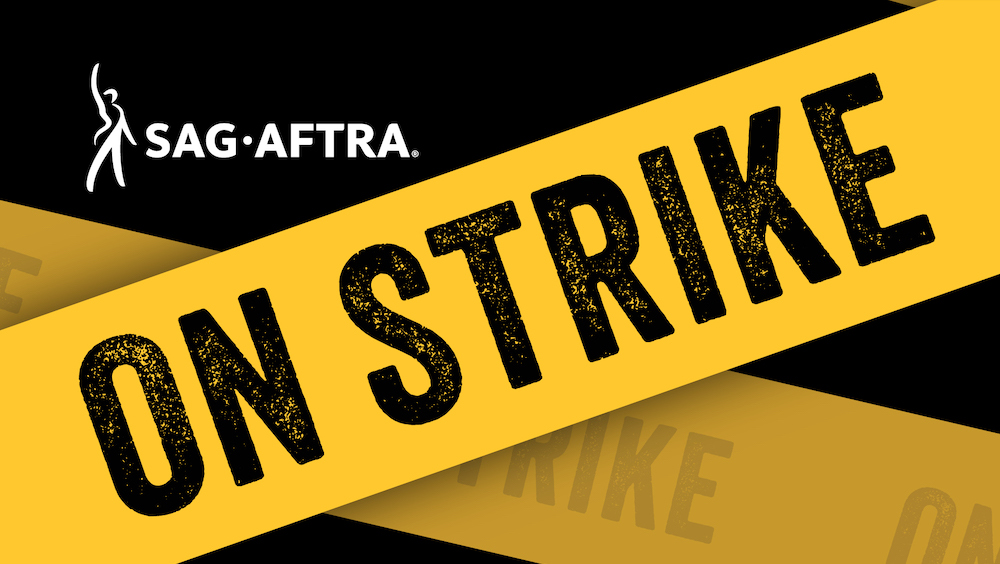Hollywood has now gone over its own particular Rubicon, a phrase named for the near-mythological river that Julius Caesar crossed, defying orders to lead his troops back into Rome, and into a civil war, the collapse of the Republic, and eventually his own undoing.
Similar historical references were made by SAG-AFTRA president Fran Drescher, at the noontime press conference she held, with the Guild’s COO and general counsel, Duncan Crabtree-Ireland (with their own negotiating committee behind them), some twelve hours after their contract, already briefly extended, expired in Sherman Oaks, itself adjacent to the L.A. river, at the bargaining table across from the AMPTP.
“Our heart bleeds that we had to make this decision,” Drescher said, in response to questions about both the community-wide impacts of an expanded work stoppage, and the earlier Deadline “leak” that the secret AMPTP strategy was to wait and starve out the strikers, until they all yielded – probably a fairly dangerous tack for the studios to take, or at least announce publicly, given the rage it engendered. “It’s a terrible thing we have to do,” she added, referencing both the article, and the seeming implacability of Wall Street’s demands, versus those of Hollywood’s artisans, workers, and craft-folk, but without being met at least somewhat in the middle, “eventually the people break down the gates of Versailles. And then it’s over.”
And indeed, something does feel “over,” as far as what Hollywood once was, in terms of worker relationships, however perpetually fraught, with studios and owners, and what it’s becoming. Even when referencing previous and similar historical moments, such as the 1960 strike of both actors and writers.
As has been frequently noted in the runup to this walkout, eventual U.S. Presidential and union-buster Ronald Reagan was in his second tour of duty as SAG president and – having already won residuals for then-new “TV” shows during an earlier stint – now tackled the issue of residuals for movie actors, whose films were being repeatedly and increasingly shown on TV.
As the Atlantic magazine told it in a surprising paean to Reagan’s SAG Presidency (but limiting the paean to that), “in the tense days following the walkout it was the studios, not (Reagan) the ex-sportscaster, who first blinked. Universal Pictures agreed, in principle, to the concept of film residuals. Eventually the other majors (Paramount, Disney, Warner Brothers, MGM, Columbia, and 20th Century Fox) fell in line and finally began negotiating the non-negotiable” issue. After five acrimonious weeks of intense back-and-forth, the two sides reached a compromise.”
That compromise included residuals for all films made for movies from 1960 onward, none for films made before 1948, and for movies made between ‘48 and ‘59, a one-time payout that “SAG would use as seed money for a new union health insurance plan and a pension plan.”
But you can already detect at least one major difference between then and now, in that citation: Universal pictures agreed first. There was no AMPTP yet, certainly no tech-sector streamers as part of it, nor were the legacy studios simply parts of the “entertainment divisions” of larger corporate interests, beholden to the aforementioned Wall Street.
How a similarly complex deal might be reached on the subject of streaming residuals – and who will be willing to make it with both writers and actors – is very much an open question. Would or could any studio cross that particular Rubicon on its own, now, ahead of the others?
It should be noted here that below the line craftsfolk, no matter how celebrated for their cinematography, costume or production design, visual effects artistry, or anything else, have never shared in those residuals, either. Nor will they get them when this strike finally ends, however it does. Making, really, the pensions and health benefits for those IATSE locals even more critical.
Drescher talked about the shared historical sense of this moment. “I have a very strong feeling that those other people will see what our members are doing,” she said. “You cannot change the business model as much as it has been changed (and) not expect the contract to change…. Dollars to donuts, it’s going to happen to you, to everybody you work with, too. That’s how threatening this moment is. “
Key among those existential threats, in terms of who might get replaced (above or below the line) is AI, and the degree to which entertainment corporations might further consider its use for “managing” or “streamlining” costs.
The AMPTP sent out a statement around one in the morning on strike night and listed all the things they said they had offered (including fixed residuals for stunt coordinators!), in terms of raises, increased pension payments, and what they termed a “groundbreaking AI proposal which protects performers’ digital likenesses.”
Asked about that, Crabtree-Ireland said, “they proposed our background performers should be able to be scanned, for one day’s pay.” Scanned, released after that day, and then, their images reused as often as necessary. “So if you think that’s a groundbreaking proposal, I suggest you think again.”
Indeed, that same afternoon, YA author Maureen Johnson took to her Twitter feed to say, “We need to stand up with the actors. AI is ALREADY HERE in our work. I just spoke to a Very Famous Author who has to remain nameless for legal reasons. They are held up in a contract negotiation because a Major Publisher wants to train AI on their work.”
A Major Publisher doubtless owned by one of the same corporate entities whose studio division makes up part of the AMPTP…
So the stakes are indeed high. An impassioned Drescher was making that clear, saying that while she’d hoped the 4th of July extension would be used for further talks and eventual agreeent, the period was “absolutely wasted… like maybe it was to let studios promote their summer movies another twelve days. They continued to cancel our meetings with them,” she said. “What we ultimately received from them was what my mom would call a ‘leck and a schmeck.”
So now it’s to the picket lines, the licking of various wounds on all sides, while gearing up for what is likely to be an unprecedented long haul, longer than that 1960 double-outage, and likely dislodging the Emmys until sometime in, well, Oscar season. The announcement of Emmy nominations already seems distant, in the present context.
Which brings us to why the AMPTP will probably settle with actors first, this fall, and “save”(or push, depending how you look at it) the writerly wrap up for winter – they need those actors for all that FYC work, on both the Emmy and Oscar fronts, and to promote the various “prestige’ and contender theatrical releases that are coming.
It isn’t personal, it’s business, to reference one famous WGA-written line, and eventually all sides – even the tech bro wing of the AMPTP – will have to get down to that business.
And yet, as complicated as the dawning of the Sixties might have seemed during that last widespread Hollywood strike – the assassinations to come, the antiwar and liberation movements, and the backlash which would put Reagan in the California governor’s seat six years later, and Richard Nixon in the White House, two years after that – how still more “stable” everything must have seemed, relative to now, as a backdrop against which to do business.
While there may have been a shared sense that the country itself was on the cusp of a great unravelment, there was no paradigm-shredding technology to upend potential settlements, or workplaces, and render any agreements moot in a few months’ time. And the weather back then could be counted to actually be stable, instead of consistently anarchic. Rivers like the Rubicon, or in L.A., or anywhere else, are now more prone to either flooding, or drying up,.
So when Drescher mentions Versailles, and the inability of those with the power to see what was really happening around them, we might also remember that what followed the storming of those gates outside of Paris, was not only the Reign of Terror, but the eventual rise of Napoleon, which in turn permanently changed boundaries, laws, and institutions across Europe (and here, if we throw in the Louisiana Purchase).
In other words, there’s no real knowing what happens next, once certain gates fall. On which note, the SAG-AFTRA strike officially begins on Friday, July 14th. A day more famously known as Bastille Day, when the French revolution kicked off in earnest.
 Mark London Williams is a BTL alum who currently covers Hollywood and its contents and discontents in his recurring “Across the Pond” dispatch for British Cinematographer magazine, contributes to other showbiz and production-minded sites, and musters out the occasional zombie, pandemic-themed, or demon-tinged book and script, causing an increased blurring in terms of what still feels like “fiction.”
Mark London Williams is a BTL alum who currently covers Hollywood and its contents and discontents in his recurring “Across the Pond” dispatch for British Cinematographer magazine, contributes to other showbiz and production-minded sites, and musters out the occasional zombie, pandemic-themed, or demon-tinged book and script, causing an increased blurring in terms of what still feels like “fiction.”
Mark’s Union Roundup column will appear regularly, and he welcomes both tips and feedback at [email protected]. He can also be found on Twitter @TricksterInk.






